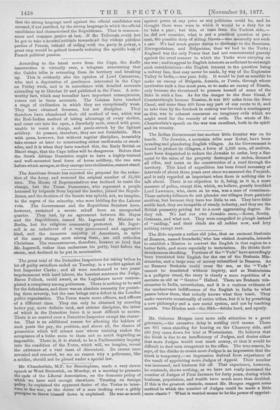The great trial of the Detective Inspectors for taking bribes
to let off guilty swindlers ended on Tuesday, in a verdict against all but Inspector Clarke ; and all were condemned to two years' imprisonment with hard labour, the heaviest sentence the Judge, Baron Pollock, could award, as the Legislature never contem- plated a conspiracy among policemen. There is nothing to be said for the defendants, and there was an absolute necessity for punish- ing them severely, but the case brings out a defect in the London police organisation. The Force wants more officers, and officers of a different class. They can only be obtained by ensuring better pay, more definite rank, and stricter discipline, the latter of which in the Detective force it is most difficult to secure. There is no control over a Detective Inspector except his charac- ter. That is an additional reason for allowing the holders of such posts the pay, the position, and above all, the chance of promotion which will attract men. whose training makes the acceptance of a bribe seem to them not so much degrading as impossible. There is, it is stated, to be a Parliamentary inquiry into the condition of the Force, which will, we imagine, reveal the existence of a vast mass of discontent. Its causes once revealed and removed, we see no reason why a policeman, like a soldier, should not be placed under a special law.






































 Previous page
Previous page